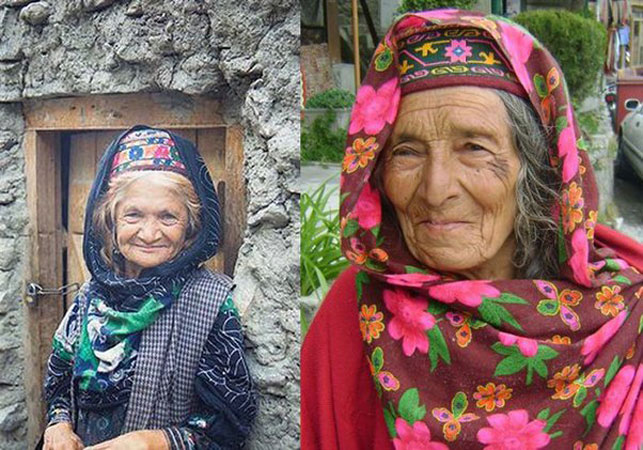 Commonly famous for its towering peaks, glaciers, lakes and dry fruit offering mesmerizing environment to visitors, the Gilgit-Baltistan (GB) is also found to be hosting long living people, especially its Hunza Valley, with people living well into their nineties and beyond.
Commonly famous for its towering peaks, glaciers, lakes and dry fruit offering mesmerizing environment to visitors, the Gilgit-Baltistan (GB) is also found to be hosting long living people, especially its Hunza Valley, with people living well into their nineties and beyond.
Living close to nature, breathing fresh air, eating natural hygienic food and walking long distances in hilly terrains are known to be key components of healthy and mostly diseases free life. The region has been a focus of many local and foreign researchers since decades to research on longevity.
Many researchers have found the diet of GB people as one of the primary contributors to their long life. Their traditional meals consist of organic, unprocessed and locally grown foods like barley, wheat, apricots, nuts and fresh vegetables.
Meat is consumed sparingly and dairy products like butter and yogurt are staple items. Apricots hold a special place with their kernels being used to make oils rich in antioxidants and Vitamin E. Other than cleaner environment and fresh drinking water, they generally not smoke, be physically active and have comparatively low rates of obesity.
Haji Karim, a 85-year-old farmer from Hunza Valley, attributes his long life to simplicity and a connection with nature. “I wake up early and spend my day working in fields. My diet is apricots, walnuts, lentils and homemade bread. We eat what we grow and drink minerals rich glacier water that keeps us strong.”
“We have lesser obesity, stress and tension. We don’t have time for that. Family and community are our priorities. We sit together, eat together and laugh together,” Haji Karim said.
The region’s water, sourced from glacial streams is exceptionally pure containing traces of essential magnesium and calcium that builds strong bones, a healthy heart and overall vitality and is commonly linked to longevity and robust health of the people.
“Longevity of people in Gilgit-Baltistan is a testament to powerful effects of natural living conditions. Pure drinking water and pollution-free air are two of the most critical factors contributing to their long and healthy lives,” remarked Dr. Jameel Ahmad a Public Health Specialist in Gilgit.
“The glacial water in this region keeps body hydrated and supports vital functions like detoxification, cellular repair and maintains healthy bones and cardiovascular health. Regular consumption of such mineral-rich water is a key contributor to vitality and longevity,” he explained.
“Pristine mountain air is another factor,” Dr. Ahmad said. “Cleaner air ensures strong respiratory systems free from damage caused by industrial toxins, vehicle emissions and urban smog. Breathing fresh oxygen-rich air enhances lungs capacity, boosts immunity and reduces inflammation for maintaining long-term health.”
“Their active lifestyle and balanced diet provide a perfect environment for healthy aging as people of GB serve as a reminder of the importance of cleaner environment in a world where water and air pollution pose significant health challenges,” Dr Ahmed said.
This is a primary home to Burusho and Wakhi people, surviving and thriving for centuries in these remote villages with minimal amenities and rudimentary health facilities, still enjoy long living.
Apricot is one of the most important local crops and believed to be help fighting cancer and other sources of inflammation in the body in part due to a compound called amygdalin. Most people in Hunza have at least one apricot tree and nearly every traditional Hunzai dish includes apricot oil.
“The GB people live in an environment that naturally promotes good health. Their active lifestyle includes farming and walking in mountainous terrain, is a key factor. Physical activity is built into their daily lives and helps maintain cardiovascular health, reduces obesity and keeps muscles strong,” said Prof. Shahid Karim from Ghezer.
“Their diet is simple but highly effective, they eat fresh and locally grown food with low-calories intake that meets their nutritional needs with research believing that calorie restriction improves metabolism and reduce inflammation,” he explained.
“Reliance on traditional herbal medicines is another factor. They use nature’s resources for healing that minimizes exposure to side effects often associated to synthetic drugs,” he added. “High altitudes make their bodies adapt to low oxygen levels that enhances lung capacity and cardiovascular efficiency.”
Distance from stress and modern life is another key factor of their longevity that provides them a serene and lifestyle. Absence of noise pollution, industrial waste and smooth living coupled with strong family and community bonds makes them to maintain a natural rhythm of life.
Just to conclude, the exceptional longevity of people of Gilgit-Baltistan is a remarkable blend of nature, tradition and simplicity. Their healthy lifestyle, revolving around organic, locally sourced foods, physical activity and a strong sense of community, offers valuable lessons us all.
By embracing a more natural, balanced approach to life by GB people – whether it’s eating wholesome foods, staying active or reducing stress -teaches us a valuable lesson towards improving our own health and well-being.
The people of Gilgit-Baltistan show us that longevity is not just about adding years to life but about adding life to those years by keeping away from daily hustle-bustle and adopting a simple and close to nature lifestyle.